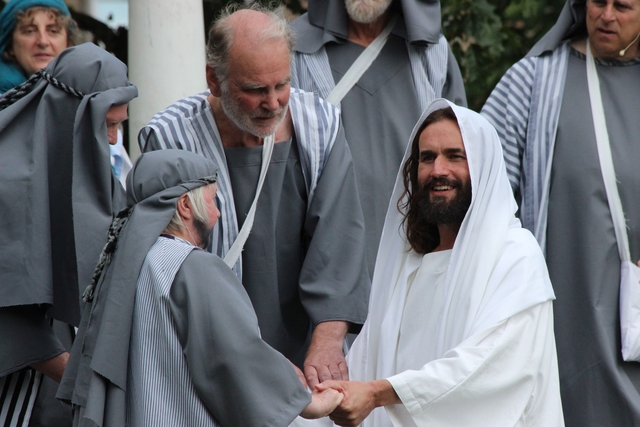 Would you like the opportunity to explore faith more? Alpha is a course run locally by a number of churches that is designed to give space to learn and discuss aspects of faith alongside others. Find a course near you at the bottom of this page.
Would you like the opportunity to explore faith more? Alpha is a course run locally by a number of churches that is designed to give space to learn and discuss aspects of faith alongside others. Find a course near you at the bottom of this page.
How did the Universe really begin?
How you answer that question might depend on who you ask. An astro-physicist might reply that the universe began several thousand million years ago as a gigantic nuclear explosion. A theologian might reply that God created the world - but might be concerned to speak more about why God created the world, than how God created the world.
The ‘why’ question is perhaps more important as it asks us to think about the purpose and meaning of creation. As far as the origin of the world is concerned, the Bible simply says that God created it (Genesis 1:1, John 1:3, Hebrews 11:3). Not all Christians agree over the origin of life. Most however believe that it is best explained by some form of evolutionary theory and they believe that this evolutionary process has been sustained by God and used by him. The Book of Genesis declares creation to be good and says that God was satisfied and pleased with his handiwork. This surely means that the world should be something we revere and delight in.
What is meant by the Trinity?
The doctrine of the Trinity lies at the heart of Christianity. In essence it claims that God’s very being is ‘relational’ – that is, God is a loving relationship between Father, Son and Holy Spirit. Christian theologians continue to wrestle with this idea, but it is more than just an abstract thought. It makes a crucial difference to the way Christians understand the world and human beings.
For, if the essence of God is relationship, it shows that we are also created for relationship – with God, with each other and with the whole universe. It is those relationships that give meaning to our lives, and if they break down, then our own lives become broken down too. That is why the saving work of Jesus is often called the ‘atonement’ - literally, the at-one-ment. Christians believe that God’s plan for the fullness of time is to unite all things in heaven and on earth in his Son Jesus Christ (Ephesians 1:9-10).

Who was Jesus?
Christians have always believed that Jesus was not just a good man, but the Son of God. We believe that he came from God, and returned again to his Father’s presence. Indeed the whole of Christianity stands or falls on whether Jesus was who he said he was.
No serious academic today believes that Jesus didn’t exist. Historians agree that he was a remarkable teacher, who amazed people 2,000 years ago with miracles that they found it hard to explain. They also know that he was crucified in the most barbaric way imaginable, and that his followers were convinced that three days later he came back to life. Many of those disciples were themselves put to death, refusing to back down on those claims. Why would they do so unless they were convinced Jesus had been resurrected?
Jesus himself also claimed to be the Son of God - God in human form, sent to save us. The Christian writer CS Lewis summed up our response to Jesus as follows: “he was either mad, bad or God.” He was either living a delusion, living a lie, or he really was God. It is impossible to say that he was just a good teacher, because he claimed to be more than that. If we don’t believe his own claims about himself, why should we believe any of his teaching?
Why did Jesus have to die?
The simple answer might be that Jesus died because he was a preacher of radical ideas, who disturbed the religious and political leaders of his time, exposed their hypocrisy, aroused their jealousy - and so was condemned to death on a cross.
That’s not the whole story. It ignores the fact that Jesus willingly laid down his own life, that no-one took it from him. He died so that we might live. He became sin so that we might be freed from sin.
As the Bible says: “Christ died for sins once for all, the righteous for the unrighteous, that he might bring us to God.” (1 Peter 3:18, RSV). We all know that forgiveness can be costly and it was costly for God to forgive us. It cost God his own Son.
We all do things that we know are wrong. Those things stop us from having a proper relationship with God. It is only as we approach God and ask for forgiveness that we can start that new relationship. Jesus’s death in our place makes that relationship possible. As we begin to understand what that means, we also become aware of the love which God has for us and for all of his creation.
Why should I go to church?
The popular view of the Church is that it is outdated, irrelevant, perhaps even reactionary. The boring sermon, the endless fundraising and the untidy churchyard are common images.
Churches are actually places where God’s love can be found in the warmth of the fellowship and in the liveliness of the worship. Here people are concerned about the world we live in and sincere in wanting to discover what it means to be a follower of Jesus today. These are not perfect people, but a community of flawed individuals asking God each week for forgiveness.
Going to Church regularly allows us to learn more about the Christian faith and deepen our commitment to God. It is possible to be a Christian without going to church, but it would be like cutting off your oxygen supply when climbing Everest. Much better to have the support and encouragement of others.

Exploring faith
Many of the parish churches in our diocese run regular Alpha courses, designed to provide an opportunity to explore questions of faith and the meaning of life. No Pressure // No Follow up // No Charge.
You may be surprised to know that a staggering 27 million people worldwide have now attended an Alpha course. Alpha is for anyone to explore the Christian faith, no matter what their background or beliefs, and is currently running in tens of thousands of churches of all denominations across the globe.
Typically, Alpha has ten sessions over ten weeks. The evenings start with a dinner, and include a short presentation on the Christian faith and a chance to discuss the talk. There is also a day away mid-way through Alpha with a chance to get to know those in your group better, learn more about Christianity and enjoy food, fun activities and even some homegrown entertainment.
Check out the Alpha courses currently running in the diocese, or visit the Alpha website to find one near you.




